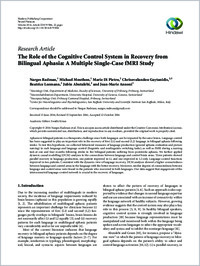The role of the cognitive control system in recovery from bilingual aphasia: a multiple single-case fMRI study
- Radman, Narges Neurology Unit, Department of Medicine, Faculty of Sciences, University of Fribourg, Switzerland
- Mouthon, Michaël Neurology Unit, Department of Medicine, Faculty of Sciences, University of Fribourg, Switzerland
- Pietro, Marie Di Neurorehabilitation Department, University Hospital, University of Geneva, Geneva, Switzerland
- Gaytanidis, Chrisovalandou Neurorehabilitation Department, University Hospital, University of Geneva, Geneva, Switzerland - Neuropsychology Unit, Fribourg Cantonal Hospital, Fribourg, Switzerland
- Leemann, Beatrice Neurorehabilitation Department, University Hospital, University of Geneva, Geneva, Switzerland
- Abutalebi, Jubin Center for Neurolinguistics and Psycholinguistics, San Raffaele University and Scientific Institute San Raffaele, Milan, Italy
- Annoni, Jean-Marie Neurology Unit, Department of Medicine, Faculty of Sciences, University of Fribourg, Switzerland
-
14.11.2016
Published in:
- Neural Plasticity. - 2016, vol. 2016, p. e8797086
English
Aphasia in bilingual patients is a therapeutic challenge since both languages can be impacted by the same lesion. Language control has been suggested to play an important role in the recovery of first (L1) and second (L2) language in bilingual aphasia following stroke. To test this hypothesis, we collected behavioral measures of language production (general aphasia evaluation and picture naming) in each language and language control (linguistic and nonlinguistic switching tasks), as well as fMRI during a naming task at one and four months following stroke in five bilingual patients suffering from poststroke aphasia. We further applied dynamic causal modelling (DCM) analyses to the connections between language and control brain areas. Three patients showed parallel recovery in language production, one patient improved in L1, and one improved in L2 only. Language-control functions improved in two patients. Consistent with the dynamic view of language recovery, DCM analyses showed a higher connectedness between language and control areas in the language with the better recovery. Moreover, similar degrees of connectedness between language and control areas were found in the patients who recovered in both languages. Our data suggest that engagement of the interconnected language-control network is crucial in the recovery of languages.
- Faculty
- Faculté des sciences et de médecine
- Department
- Médecine 3ème année
- Language
-
- English
- Classification
- Biological sciences
- License
-
License undefined
- Identifiers
-
- RERO DOC 278621
- DOI 10.1155/2016/8797086
- Persistent URL
- https://folia.unifr.ch/unifr/documents/305377
Statistics
Document views: 102
File downloads:
- pdf: 152
